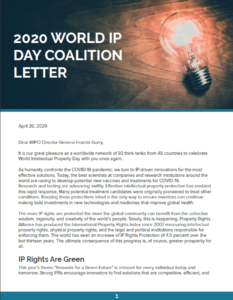The USTR Reminds World to Continue Fighting for IP Rights
Despite the COVID 19 pandemic arresting the work of government offices and businesses in Washington D.C., the United States Trade Representative was able to publish its 2020 Special 301 Report. The annual document is the result of public comments, hearings, and coordination with other government branches such as the USPTO IP Attaché program to investigate which countries fail to provide adequate and effective protection and enforcement of intellectual property rights.
This year, the USTR placed 23 countries on its Watch List and 10 countries on the priority watch list, indicating “that particular problems exist in that country” and mandates the USTR to create an action plan. On the watch list this year were countries including Brazil, Canada, Mexico, and Turkey. On the priority watch list are the usual suspects, such as China, Russia, and Venezuela. A good indication of whether or not a country will be placed on the list comes from Property Rights Alliance’s very own Intellectual Property Rights Index.
PRA’s International Property Rights Index reflects similar findings presented in the Special 301 report. Of the 33 countries mentioned in the report all but one, Canada, have an IP Protection score below the 8.09 median for North America and Western Europe, regions that lead in the category. In fact, the median score for Watch List countries, 5.27, and Priority Watch List countries, 5.03, place them below the world average of 5.55 for IP protections.
By advocating for American IP protections abroad the innovators, artists, and entrepreneurs in partner countries benefit as well. In many countries on the list the U.S. assists in training and workshops for customs officials to catch counterfeits, engages partners on fighting digital piracy, advocates for the modernization of patent offices, and proper management of copyrights. These IP protections empower all rights holders, regardless of their country of origin.
Notable countries mentioned on the 301 report:
Mexico and Canada: both are on the Watch List and are also the United States’ closest trading partners, a relationship enshrined in the new tri-lateral USMCA free-trade agreement to go into effect July 1, 2020. The report notes both of them for pharmaceutical and medical device market access challenges.
Specifically, for Canada the report notes the country suffers from, “poor enforcement with respect to counterfeit or pirated goods…, deficient copyright protection, and inadequate transparency and due process regarding geographical indications (GIs) protected through free trade agreements.”
While Mexico, the report states, fails “to provide sufficient resources to intellectual property (IP) protection.” It encourages Mexico to set up a specialized IP unit within the Attorney General’s office, coordinate IP enforcement between federal offices, and pay special attention to the role of organized crime in counterfeit goods online and in physical markets.
As a result of China’s continued presence on the 301 Priority Watch List, President Trump directed USTR Robert Lighthizer to negotiate a trade deal to resolve China’s coerced intellectual property transfers and other IP violations. Despite escalating rhetoric relating to the true origin of the coronavirus and a lethargic global economy as a result of stay-at-home orders across the globe, both sides have “agreed that good progress is being made,” keeping phase 1 of the deal moving along unperturbed.
Chile’s IP protections on the IPRI rank 2nd in the Latin America and Caribbean region and 35th in the world. It has made strides in opening up its economy and some market reforms, yet remains on the Priority Watch List. The U.S. faults Chile for ineffective judicial procedures to stop digital piracy and urges the country “to make effective its system for resolving patent issues expeditiously in connection with applications to market pharmaceutical products and to provide adequate protection against unfair commercial use, as well as unauthorized disclosure, of undisclosed test or other data generated to obtain marketing approval for pharmaceutical products.”
The United States also advises Chile to protect the integrity and predictability of the IP system, which could be jeopardized if it chooses to issue compulsory licenses. Chile has maintained Resolution 399, which satisfies an initial requirement to issue a license for Hepatitis C drugs. but has not followed through.
Saudi Arabia is hosting the G20 this year and is touting its role as a force “stabilizing the global economy,” its modernization Vision 2030 plan, and objective to increase the flow of trade and investment. Yet, the Kingdom landed on the Priority Watch List and is 5th in region and 53rd in the world for protection IP on the IPRI. In order to improve the USTR urges the country to “take action against the rampant satellite and online piracy made available by illicit pirate service beoutQ, continued lack of effective protection of intellectual property (IP) for pharmaceutical products, as well as long outstanding concerns regarding enforcement against counterfeit and pirated goods within the country.”
Asia has the smallest gap in IP protections when measured against Western Europe and North America at 22 percent. However, Indonesia falls far below the region’s average score of 5.7 at 4.41, placing it 16th in the region and 98th in the world. It is no surprise to see it placed on the Priority Watch List again. According to the USTR, Indonesia must tackle widespread piracy and counterfeiting, enact deterrent level penalties; and clarify concerns that the 2016 patent law reduces patentability, the criteria the country would issue a compulsory license, and data disclosure requirements.
Finally, while the United States is at the forefront of protecting IP rights globally, it is not alone. PRA celebrated April 26, World IP Day by issuing a coalition letter sign by a record 96 think tanks from 50 countries around the world advocating for stronger protections. You can read that letter here. There are enormous benefits to robust IP protection: accelerated economic growth, an increase in high-skill employment, and being able to participate in cutting-edge science. Even without these, IP rights are human rights and governments all over should protect them in order to allow their inventors, entrepreneurs, and artists to own the fruits of their labor.


